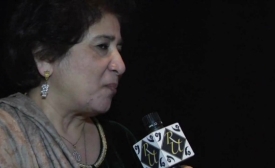public diplomacy
Despite its size, Indonesia is distinctly lacking in hard-power assets. The source of Indonesia’s influence is soft power, which it has used to create regional institutions such as the Association of Southeast Asian Nations (ASEAN) to promote regional stability and pursue its key strategic objective of ensuring that Southeast Asia never fall under the hegemony of an outside power.
The challenges posed by the new media landscape...will likely take years to fully comprehend. But as the contours of the role of social media in the Arab Spring and elsewhere begin to take shape in the academic and policy-making arenas, everyone seems to agree on one point: The revolution is far from over.
Golbi, 19, and the winner of the 2010 season of "Kochav Nolad" - the Israeli incarnation of "American Idol" - performed a short set of songs on behalf of ELEM, a nonprofit organization that assists and rehabilitates “distressed youth” in Israel with programs ranging from counseling and social services to vocation and job training.
A promotional campaign urging visitors from the Gulf to visit Jordan appears to be paying off for the Hashemite Kingdom, whose hotels and attractions have been struggling with a drop in tourism from Europe and America. Jordan has been hoping to capitalize on its image of a relatively calm country amidst turbulent unrest to draw visitors.

The USC Center on Public Diplomacy was pleased to host Riffat Masood, the Consul General of Pakistan in Los Angeles for a conversation about Pakistan, U.S., and public diplomacy. Consul General Masood discussed how the relationship between Pakistan and the United States, could benefit from public diplomacy efforts initiated by each country toward the other.
Don’t be fooled, citizens of China: Newly arrived U.S. ambassador Gary Locke’s humble do-it-yourself demeanor is all part of a crafty neo-colonialist plot. Such at least is the message of a state media editorial that is making waves on the Chinese Internet. The response so far among Chinese Internet users: Bring it on.
Another week, another public round of warm applause for America’s new ambassador to China, Gary Locke. A senior official behaving as humbly as a normal human being is a breath of fresh air in China, where officials are widely reviled for the lavish lifestyles many of them enjoy, often paid for by corruption. The attention Locke has garnered is freighted with political significance
The war in Libya and the activities of three Africa-based Islamist groups have raised questions about whether Africom may be shifting from its initial posture of projecting soft power to one of managing a hot theater. However...while Africom's public affairs posture may now be in flux, the command's core mission of growing African capabilities to meet African security challenges has not changed.







